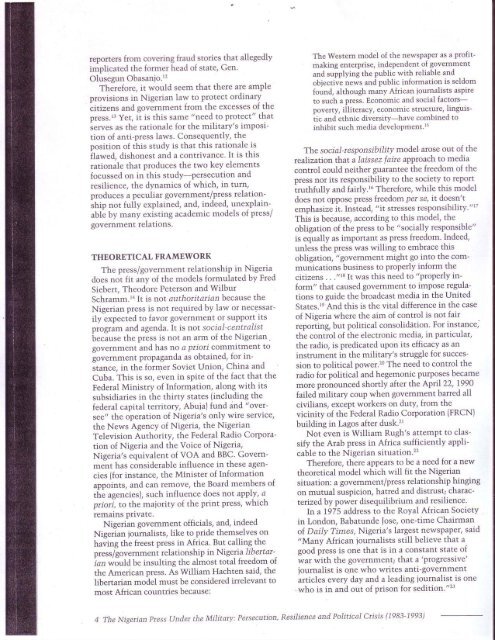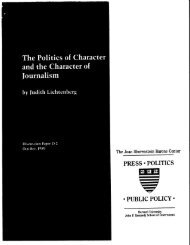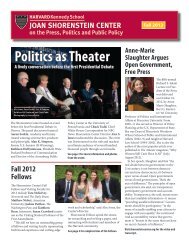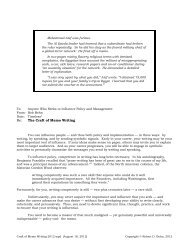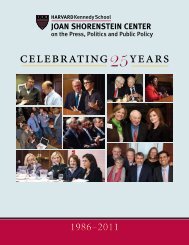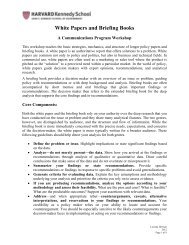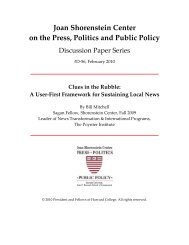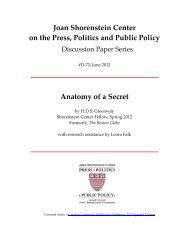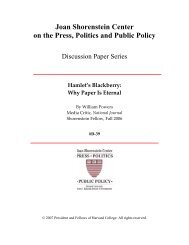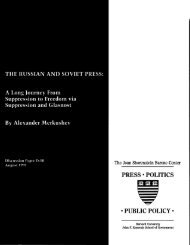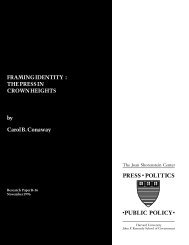The Nigerian Press Under the Military - Joan Shorenstein Center on ...
The Nigerian Press Under the Military - Joan Shorenstein Center on ...
The Nigerian Press Under the Military - Joan Shorenstein Center on ...
Create successful ePaper yourself
Turn your PDF publications into a flip-book with our unique Google optimized e-Paper software.
eporters from covering fraud stories that allegedly<br />
implicated <str<strong>on</strong>g>the</str<strong>on</strong>g> former head of state, Gen.<br />
Olusegun Obasanio.12<br />
<str<strong>on</strong>g>The</str<strong>on</strong>g>refore, it would seem that <str<strong>on</strong>g>the</str<strong>on</strong>g>re are ample<br />
provisi<strong>on</strong>s in <str<strong>on</strong>g>Nigerian</str<strong>on</strong>g> law to protect ordinary<br />
iitir"nr and government from <str<strong>on</strong>g>the</str<strong>on</strong>g> excesses of <str<strong>on</strong>g>the</str<strong>on</strong>g><br />
press.r3 Yet, it is this same "need to protect" that<br />
serves as <str<strong>on</strong>g>the</str<strong>on</strong>g> rati<strong>on</strong>ale for <str<strong>on</strong>g>the</str<strong>on</strong>g> military's impositi<strong>on</strong><br />
of anti-press laws. C<strong>on</strong>sequently, <str<strong>on</strong>g>the</str<strong>on</strong>g><br />
positi<strong>on</strong> of this study is that this rati<strong>on</strong>ale is<br />
ilawed, dish<strong>on</strong>est and a c<strong>on</strong>trivance' It is this<br />
rati<strong>on</strong>ale that produces <str<strong>on</strong>g>the</str<strong>on</strong>g> two key elements<br />
focussed <strong>on</strong> in this study-persecuti<strong>on</strong> and<br />
resilience, <str<strong>on</strong>g>the</str<strong>on</strong>g> dynamics of which, in turn,<br />
produces a peculiar government/press relati<strong>on</strong>ihip<br />
not fully explained, and, indeed, unexplainable<br />
by many existing academic models of press/<br />
government relati<strong>on</strong>s.<br />
THEORETICAL FRAMEWORK<br />
<str<strong>on</strong>g>The</str<strong>on</strong>g> press/government relati<strong>on</strong>ship in Nigeria<br />
does not fit any of <str<strong>on</strong>g>the</str<strong>on</strong>g> models formulated by Fred<br />
Siebert, <str<strong>on</strong>g>The</str<strong>on</strong>g>odore Peters<strong>on</strong> and Wilbur<br />
Schramm.ra It is not authoiltafian because <str<strong>on</strong>g>the</str<strong>on</strong>g><br />
<str<strong>on</strong>g>Nigerian</str<strong>on</strong>g> press is not required by law or necessarily<br />
expected to favor Sovernment or support its<br />
program and agenda. It is not social-centtalist<br />
because <str<strong>on</strong>g>the</str<strong>on</strong>g> press is not an arm of <str<strong>on</strong>g>the</str<strong>on</strong>g> <str<strong>on</strong>g>Nigerian</str<strong>on</strong>g>.<br />
government and has no a ptiori commitment to<br />
government propaganda as obtained, for init"n"",<br />
in <str<strong>on</strong>g>the</str<strong>on</strong>g> former Soviet Uni<strong>on</strong>, China and<br />
Cuba. This is so, even in spite of <str<strong>on</strong>g>the</str<strong>on</strong>g> fact that <str<strong>on</strong>g>the</str<strong>on</strong>g><br />
Federal Ministry of Inforr4ati<strong>on</strong>, al<strong>on</strong>g with its<br />
subsidiaries in <str<strong>on</strong>g>the</str<strong>on</strong>g> thirty states {including <str<strong>on</strong>g>the</str<strong>on</strong>g><br />
federal capital territory, Abuja) fund and "oversee"<br />
<str<strong>on</strong>g>the</str<strong>on</strong>g> operati<strong>on</strong> of Nigeria's <strong>on</strong>ly wire service,<br />
<str<strong>on</strong>g>the</str<strong>on</strong>g> News Agency of Nigeria, <str<strong>on</strong>g>the</str<strong>on</strong>g> <str<strong>on</strong>g>Nigerian</str<strong>on</strong>g><br />
Televisi<strong>on</strong> Authority, <str<strong>on</strong>g>the</str<strong>on</strong>g> Federal Radio Corporati<strong>on</strong><br />
of Nigeria and <str<strong>on</strong>g>the</str<strong>on</strong>g> Voice of Nigeria,<br />
Nigeria's equivalent of VOA and BBC. Government<br />
has c<strong>on</strong>siderable influence in <str<strong>on</strong>g>the</str<strong>on</strong>g>se agencies<br />
(for instance, <str<strong>on</strong>g>the</str<strong>on</strong>g> Minister of Informati<strong>on</strong><br />
appoints, and can remove, <str<strong>on</strong>g>the</str<strong>on</strong>g> Board members of<br />
tL- agencies), such influence does not apply, q<br />
prioti, to <str<strong>on</strong>g>the</str<strong>on</strong>g> majority of <str<strong>on</strong>g>the</str<strong>on</strong>g> print press, which<br />
remains private.<br />
<str<strong>on</strong>g>Nigerian</str<strong>on</strong>g> govemment officials, and, indeed<br />
<str<strong>on</strong>g>Nigerian</str<strong>on</strong>g> ioumalists, like to pride <str<strong>on</strong>g>the</str<strong>on</strong>g>mselves <strong>on</strong><br />
having <str<strong>on</strong>g>the</str<strong>on</strong>g> freest press in Nrica- But caliing <str<strong>on</strong>g>the</str<strong>on</strong>g><br />
press/govemment relati<strong>on</strong>ship in Nigeria lib efi ar<br />
ian would be insulting <str<strong>on</strong>g>the</str<strong>on</strong>g> almost total freedom of<br />
<str<strong>on</strong>g>the</str<strong>on</strong>g> American press. As William Hachten said, <str<strong>on</strong>g>the</str<strong>on</strong>g><br />
libertarian model must be c<strong>on</strong>sidered irrelevant to<br />
most A{rican countries because:<br />
<str<strong>on</strong>g>The</str<strong>on</strong>g> Western model of <str<strong>on</strong>g>the</str<strong>on</strong>g> newspaper as a profitmaking<br />
enterprise, independent of government<br />
and supplying <str<strong>on</strong>g>the</str<strong>on</strong>g> public with reliable and<br />
obiective news and public informati<strong>on</strong> is seldom<br />
found, although many African iournalists aspire<br />
to such a press. Ec<strong>on</strong>omic and social factorspoverty/<br />
iiliteracy, ec<strong>on</strong>omic structure, linguistic<br />
and ethnic diversity-have combined to<br />
inhibit such media development.ts<br />
<str<strong>on</strong>g>The</str<strong>on</strong>g> social-tesp<strong>on</strong>sibilitlt model arose out of <str<strong>on</strong>g>the</str<strong>on</strong>g><br />
reaLizati<strong>on</strong> that a laissez faite approach to media<br />
c<strong>on</strong>trol could nei<str<strong>on</strong>g>the</str<strong>on</strong>g>r guarantee <str<strong>on</strong>g>the</str<strong>on</strong>g> freedom of <str<strong>on</strong>g>the</str<strong>on</strong>g><br />
press nor its resp<strong>on</strong>sibility to <str<strong>on</strong>g>the</str<strong>on</strong>g> society to report<br />
iruthfully and fairly.'6 <str<strong>on</strong>g>The</str<strong>on</strong>g>refore, while this model<br />
does not oppose press freedomper se, it doesn't<br />
emphasize it. Instead, "it stresses resp<strong>on</strong>sibility."rT<br />
This is because, according to this model, <str<strong>on</strong>g>the</str<strong>on</strong>g><br />
obligati<strong>on</strong> of <str<strong>on</strong>g>the</str<strong>on</strong>g> press to be "socially resp<strong>on</strong>sible"<br />
is equally as important as press freedom. Indeed,<br />
unless <str<strong>on</strong>g>the</str<strong>on</strong>g> press was willing to embrace this<br />
obligati<strong>on</strong>, "government might go into <str<strong>on</strong>g>the</str<strong>on</strong>g> communicati<strong>on</strong>s<br />
business to properly inform <str<strong>on</strong>g>the</str<strong>on</strong>g><br />
citizens . . ."18 It was this need to "properly inform"<br />
that caused govemment to impose regulati<strong>on</strong>s<br />
to guide <str<strong>on</strong>g>the</str<strong>on</strong>g> broadcast media in <str<strong>on</strong>g>the</str<strong>on</strong>g> United<br />
States.re And this is <str<strong>on</strong>g>the</str<strong>on</strong>g> vital difference in <str<strong>on</strong>g>the</str<strong>on</strong>g> case<br />
of Nigeria where <str<strong>on</strong>g>the</str<strong>on</strong>g> aim of c<strong>on</strong>trol is not fair<br />
reporiing, but political c<strong>on</strong>soliddti<strong>on</strong>. For instance,<br />
thi c<strong>on</strong>trol of <str<strong>on</strong>g>the</str<strong>on</strong>g> electr<strong>on</strong>ic media, in particular,<br />
<str<strong>on</strong>g>the</str<strong>on</strong>g> radio, is predicated up<strong>on</strong> its efficacy as an<br />
instrument in <str<strong>on</strong>g>the</str<strong>on</strong>g> military's struggle for successi<strong>on</strong><br />
to political power.2o <str<strong>on</strong>g>The</str<strong>on</strong>g> need to c<strong>on</strong>trol <str<strong>on</strong>g>the</str<strong>on</strong>g><br />
radio for political and hegem<strong>on</strong>ic purposes became<br />
more pr<strong>on</strong>ounced shortly after <str<strong>on</strong>g>the</str<strong>on</strong>g> AprlI}Z,l99O<br />
failed military coup when govemment barred all<br />
civilians, except workers <strong>on</strong> duty, from <str<strong>on</strong>g>the</str<strong>on</strong>g><br />
vicinity of <str<strong>on</strong>g>the</str<strong>on</strong>g> Federal Radio Corporati<strong>on</strong> (FRCNI<br />
building in Lagos after dusk.2r<br />
Not even is William Rugh's attempt to classify<br />
<str<strong>on</strong>g>the</str<strong>on</strong>g> Arab press in A{rica sufficiently applicable<br />
to <str<strong>on</strong>g>the</str<strong>on</strong>g> <str<strong>on</strong>g>Nigerian</str<strong>on</strong>g> situati<strong>on</strong>.22<br />
<str<strong>on</strong>g>The</str<strong>on</strong>g>refore, <str<strong>on</strong>g>the</str<strong>on</strong>g>re appears to be a need for a new<br />
<str<strong>on</strong>g>the</str<strong>on</strong>g>oretical model which will fit <str<strong>on</strong>g>the</str<strong>on</strong>g> <str<strong>on</strong>g>Nigerian</str<strong>on</strong>g><br />
situati<strong>on</strong>: a govemment/press relati<strong>on</strong>ship hinging<br />
<strong>on</strong> mutual suspici<strong>on</strong>, hatred and distrust; characterwedby<br />
power disequilibrium and resilience.<br />
In a 1975 address to <str<strong>on</strong>g>the</str<strong>on</strong>g> Royal African Society<br />
in L<strong>on</strong>d<strong>on</strong>, Babatunde fose, <strong>on</strong>e-time Chairman<br />
of Daily Times, Nigeria's largest newspaper, said<br />
"Many A{rican iournalists stiil believe that a<br />
good press is <strong>on</strong>e that is in a c<strong>on</strong>stant state of<br />
war with <str<strong>on</strong>g>the</str<strong>on</strong>g> government; that a'progressive'<br />
journalist is <strong>on</strong>e who writes anti-government<br />
articles every day and a leading journalist is <strong>on</strong>e<br />
who is in and out of pris<strong>on</strong> {or sediti<strong>on</strong>."23<br />
4 <str<strong>on</strong>g>The</str<strong>on</strong>g> <str<strong>on</strong>g>Nigerian</str<strong>on</strong>g> press<br />
[Jnder <str<strong>on</strong>g>the</str<strong>on</strong>g> <str<strong>on</strong>g>Military</str<strong>on</strong>g>: Persecuti<strong>on</strong>, Resilience and Politica] crisis (1983-L993)


